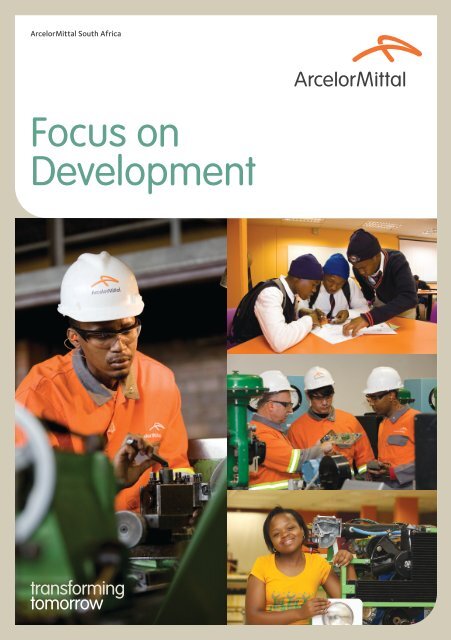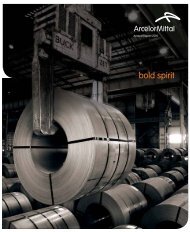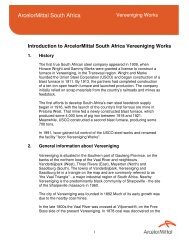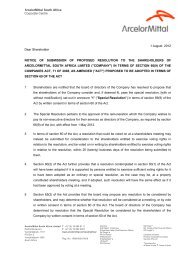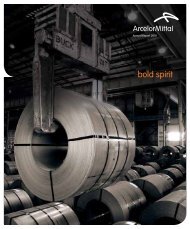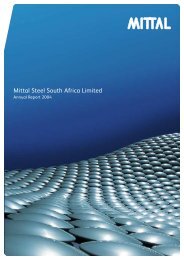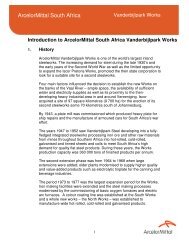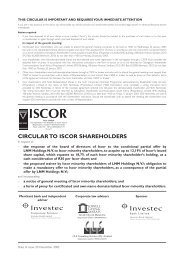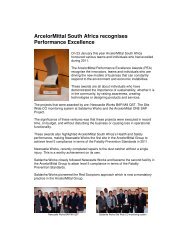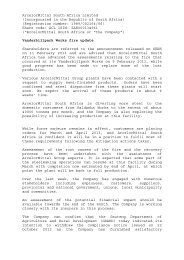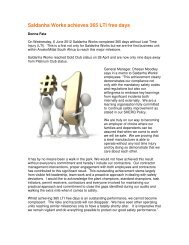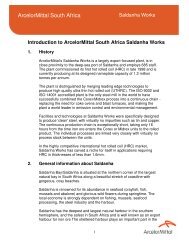Development brochure.cdr - ArcelorMittal South Africa
Development brochure.cdr - ArcelorMittal South Africa
Development brochure.cdr - ArcelorMittal South Africa
Create successful ePaper yourself
Turn your PDF publications into a flip-book with our unique Google optimized e-Paper software.
<strong>ArcelorMittal</strong> <strong>South</strong> <strong>Africa</strong><br />
Focus on<br />
<strong>Development</strong>
Message from the CEO:<br />
Putting Corporate Responsibility at the heart<br />
of our business<br />
<strong>ArcelorMittal</strong> <strong>South</strong> <strong>Africa</strong> prides itself in being the lifeblood of a developing nation. Steel is<br />
fundamental to our economy. It is the core material in construction, housing, packaging and<br />
household goods.<br />
At <strong>ArcelorMittal</strong> <strong>South</strong> <strong>Africa</strong>, it is our aim to become an outstanding player in the steel sector, and<br />
this requires that we provide superior returns to our shareholders. We recognise that being global<br />
and maintaining a leading global position carries increased responsibility, enhanced accountability<br />
and higher performance levels in every sphere of our business. We can achieve this only through<br />
genuine partnerships with employees, customers, shareholders, local communities and other<br />
stakeholders, based on integrity, co-operation, transparency and mutual value creation.<br />
The financial crisis and the economic recession it triggered affected people around the world. This<br />
is a period of intense change for our employees and our company, and our response has been to<br />
intensify our commitment to areas such as skills training, education, enterprise development and<br />
community investment.<br />
As an industry leader we recognise that our work in these areas is increasingly important. In this<br />
profile of our corporate responsibility, we have used case studies to illustrate how we translate our<br />
sustainability goals and targets into actions in practice. This report is part of our commitment to<br />
conduct ourselves in the best interests of the communities in which we operate, to develop the<br />
potential of our people and to entrench sound governance.<br />
Nonkululeko Nyembezi-Heita<br />
Chief Executive Officer
Skills <strong>Development</strong><br />
Skills <strong>Development</strong> and Retention<br />
<strong>ArcelorMittal</strong> <strong>South</strong> <strong>Africa</strong> recognises that<br />
developing, attracting and retaining talent is<br />
crucial to its continued success. The skills crisis<br />
continues however, to present our company<br />
with a serious challenge. As a result, targeted<br />
skills development programmes, career<br />
development initiatives and leadership training<br />
form essential parts of our skills development<br />
strategy; ensuring that we foster talent from<br />
within and outside of our operations.<br />
<strong>ArcelorMittal</strong> <strong>South</strong> <strong>Africa</strong>'s core business<br />
relies heavily on being able to access skilled<br />
people in the scientific, engineering,<br />
technological and artisanal sectors. We have<br />
therefore directed our CSI budget at<br />
programmes that empower people through<br />
improved education and skills training.<br />
<strong>ArcelorMittal</strong> <strong>South</strong> <strong>Africa</strong>'s strategy broadly<br />
includes promoting maths and science skills at<br />
high schools; an extensive bursary programme<br />
for artisans, engineers and other technical skills<br />
and programmes that include upgrading the<br />
skills of its own employees.<br />
This investment not only ensures that the<br />
company has a pool of skilled resources for its<br />
own operations, but also contributes towards<br />
addressing the skills shortage in the country in<br />
general. Under government's Jipsa programme<br />
<strong>ArcelorMittal</strong> has committed itself to<br />
producing more artisans than it needs for its<br />
own businesses.<br />
Our multi-million rand investment strategy to<br />
date has been successful, leading to<br />
<strong>ArcelorMittal</strong> being recognised as a corporate<br />
leader in the field of skills development and<br />
training. We are represented in the Technical<br />
Business Skill Partnership, a national initiative<br />
by six leading <strong>South</strong> <strong>Africa</strong>n companies, which<br />
have committed to training more than 5 400<br />
artisans over the next three years. Through<br />
the College Industry Partnerships programme<br />
we interact with further education and training<br />
colleges to advance an industry-specific<br />
agenda, and sit on various university advisory<br />
committees that advise on the content of the<br />
curriculum for the engineering and related<br />
sciences.<br />
<strong>ArcelorMittal</strong> <strong>South</strong> <strong>Africa</strong>'s implementation of<br />
retention mechanisms, such as aligning internal<br />
remuneration practices and salary structures<br />
with best practices in the market, has also<br />
made a positive impact on our ability to retain<br />
our talent. In the year under review, we have<br />
also been able to use our affiliation with the<br />
<strong>ArcelorMittal</strong> group to access industry experts,<br />
knowledge and critical skills from the global<br />
arena.<br />
<strong>ArcelorMittal</strong> <strong>South</strong> <strong>Africa</strong> recently embarked<br />
on a management and leadership development<br />
initiative supported by the global <strong>ArcelorMittal</strong><br />
University. In 2008, we participated in 96<br />
management development courses and trained<br />
1 402 employees in management and<br />
leadership skills. In addition, we funded 7<br />
employees to obtain an MBA qualification and<br />
21 to attend the advanced management<br />
programme at Wits Business School.<br />
Training needs are determined through an<br />
annual skills audit for all categories. This<br />
information is incorporated into a workplace<br />
skills plan and included in the annual training<br />
report.
Qualified candidates who<br />
completed training<br />
Engineering bursars<br />
Candidate engineers<br />
Learner technicians<br />
Candidate technicians<br />
Artisan to technician conversion<br />
Apprentices<br />
Production learners (non-learnership)<br />
Production learners (learnership)<br />
Learners basic engineering<br />
skills programme<br />
Graduates in Training<br />
Total<br />
2007<br />
10<br />
19<br />
15<br />
0<br />
0<br />
61<br />
23<br />
10<br />
0<br />
–<br />
138<br />
EE<br />
2007<br />
2007<br />
11<br />
8<br />
22<br />
10<br />
0<br />
104<br />
33<br />
0<br />
26<br />
11<br />
225<br />
Non EE<br />
2007<br />
5<br />
6<br />
1<br />
0<br />
0<br />
11<br />
4<br />
2<br />
0<br />
–<br />
29<br />
2008<br />
6<br />
18<br />
3<br />
1<br />
0<br />
25<br />
7<br />
0<br />
6<br />
1<br />
67<br />
EE %<br />
2008<br />
67%<br />
76%<br />
94%<br />
0%<br />
0%<br />
85%<br />
85%<br />
83%<br />
0<br />
0<br />
83%<br />
2007<br />
65%<br />
31%<br />
88%<br />
91%<br />
0%<br />
81%<br />
83%<br />
0%<br />
81%<br />
92%<br />
77%<br />
Initiatives Undertaken and Progress<br />
On Goals<br />
The year under review saw the achievement of<br />
a number of skills development goals and the<br />
implementation of new initiatives that will help<br />
us tackle the skills challenge. These included:<br />
Bursaries<br />
Our bursary programme plays an important<br />
role in providing us with qualified engineering<br />
graduates. A total of 81 bursars (comprising<br />
39 black males, 11 black females, 22 white<br />
males and 9 white females) are currently<br />
studying engineering sciences through this<br />
scheme, while 17 (7 black males, 1 black<br />
female, 7 white males and 2 white females)<br />
have completed their degrees.<br />
These graduates are in the process of<br />
completing an engineer-in-training<br />
programme that complies with the<br />
requirements of the Board for Professional<br />
Engineers, after which they will be employed<br />
by various divisions in the company.<br />
Graduates in Training<br />
A total of 12 graduates from our 2006 intake<br />
successfully completed their two-year<br />
internship during 2008. They have been<br />
absorbed into different departments. In 2007,<br />
12 new graduates started their training<br />
programme while 2008 saw an intake of 25<br />
graduates (including 12 black females).<br />
Production Employee<br />
<strong>Development</strong><br />
During the year, <strong>ArcelorMittal</strong> became the first<br />
<strong>South</strong> <strong>Africa</strong>n company to pilot and complete<br />
all three National Qualifications Framework<br />
levels (NQF 2, 3 and 4) for the newly<br />
developed production learnership qualification.<br />
This affords our production employees a<br />
formal national qualification with status and<br />
salary equal to that of a maintenance artisan.<br />
The learnership covers fundamental<br />
competencies such as mathematics and<br />
communication, as well as work-related<br />
competencies. The qualification has offered<br />
employees a holistic overview of the<br />
production process and is being run at all the<br />
operations.<br />
Artisan Training<br />
<strong>ArcelorMittal</strong>'s Accelerated Artisan Training<br />
Programme has been adopted by the<br />
Manufacturing, Engineering and Related<br />
Services Sector Education and Training<br />
Authority. It presents a major break from the<br />
convention of training artisans over four years;<br />
instead it involves an 80-week training period<br />
that seeks to address not only our own need<br />
for artisans, but also aims to meet the national<br />
skills development goals set by Joint Initiative<br />
on Priority Skills Acquisition. During the year,<br />
the total number of learners in the training<br />
pipeline rose from X to 655 of whom 86% are<br />
EE candidates.
Education <strong>Development</strong><br />
The key pillar of <strong>ArcelorMittal</strong> <strong>South</strong> <strong>Africa</strong>’s<br />
skills policy – and also that of JIPSA – is to<br />
align tertiary education and other institutional<br />
training with the actual skills required by both<br />
the public and private sectors. <strong>ArcelorMittal</strong><br />
<strong>South</strong> <strong>Africa</strong>’s core business relies heavily on<br />
being able to access skilled people in the<br />
scientific, engineering and technological fields.<br />
Improving maths and science performance at<br />
schools in the communities around the<br />
company’s areas of operation provides a<br />
sustainable resource for <strong>ArcelorMittal</strong> <strong>South</strong><br />
<strong>Africa</strong> and works towards alleviating the<br />
national skills crisis.<br />
Science Centres<br />
Underlining this commitment is the company’s<br />
R28 million investment in Science Centres in<br />
Sebokeng and Saldanha, adjacent to its<br />
Vanderbijlpark and Saldanha operations<br />
respectively.<br />
The flagship Science Centre in Sebokeng was<br />
launched in 2006 and serves the entire Vaal<br />
Triangle region. The Science Centre has<br />
uplifted the level of science, mathematics and<br />
IT education for over 2000 pupils at 43<br />
schools in Sebokeng. Much-needed<br />
mathematics and science tutoring has also<br />
been received by at least 30 teachers. The<br />
centre provides pupils with access to<br />
classrooms, science laboratories, state-ofthe-art<br />
computer centres and interactive<br />
science exhibitions and offers curriculumlinked<br />
science and mathematics instruction. It<br />
contributed towards a higher-than-average<br />
pass rate among matriculants in the area<br />
during 2008. Fifteen successful matriculants<br />
have received <strong>ArcelorMittal</strong> bursaries, including<br />
five bursars studying engineering at<br />
universities.<br />
On 5 December 2008 <strong>ArcelorMittal</strong> <strong>South</strong><br />
<strong>Africa</strong> launched its second Science Centre in<br />
the Vredenburg/Saldanha Bay region of the<br />
Western Cape. This centre was built and<br />
equipped in co-operation with the Department<br />
of Education and the Department of Science<br />
and Technology.<br />
DoE Partnership<br />
In February 2009 <strong>ArcelorMittal</strong> <strong>South</strong> <strong>Africa</strong><br />
and the Department of Education (DoE)<br />
announced a partnership to build ten new<br />
schools throughout the country using new<br />
steel technology. The announcement was<br />
made at the sod turning ceremony of the new<br />
primary school for the pupils and community<br />
of Mamelodi (in Tshwane), the first school in<br />
this programme.<br />
Mamelodi Primary School is being built using<br />
the pioneering method of insulated panels<br />
technology, which relies heavily on steel as a<br />
building material. It can withstand extreme<br />
weather conditions, is fire resistant and ten<br />
times faster to erect than using conventional<br />
building technologies. This investment in<br />
primary education completes the circle of<br />
investment for <strong>ArcelorMittal</strong> <strong>South</strong> <strong>Africa</strong><br />
which now boasts a fully integrated education<br />
and skills strategy upon which to structure<br />
future investments.<br />
Case Study:<br />
Bursar overcomes the odds<br />
In 2008, the strongest candidate to emerge<br />
out of the Grade 12 Examination in the<br />
Sebokeng area was a 17-year-old student<br />
from Moshate Secondary School, Busiswa<br />
Bobi. Busi is an orphan who lives in a shack in<br />
the township and who managed to obtain<br />
three distinctions for Maths, English and<br />
IsiXhosa. Her hard work paid off, making her<br />
one of 15 candidates who qualified for an<br />
<strong>ArcelorMittal</strong> university bursary to study<br />
chemical engineering at the University of the<br />
North West in Potchefstroom.
Enterprise <strong>Development</strong><br />
<strong>ArcelorMittal</strong> <strong>South</strong> <strong>Africa</strong> has made some<br />
progress in developing broad-based black<br />
economic empowerment (BBBEE) enterprises<br />
through a number of initiatives aimed at<br />
suppliers to the company and supporting<br />
small-to-medium-sized enterprises (SMEs).<br />
In 2008 a development fund with a budget<br />
allocation of R250 million was initiated to<br />
provide loan finance, mentorship and<br />
management services to SMEs in the<br />
company’s supply chain as well as the<br />
downstream steel industry. The fund, which is<br />
administrated by Vesco Community Services,<br />
considers applications for amounts exceeding<br />
R500 000 from SMEs that comply with the<br />
BBBEE Ownership Codes. Vesco assists<br />
<strong>ArcelorMittal</strong> <strong>South</strong> <strong>Africa</strong> in assessing the<br />
viability of entrepreneurial enterprises and<br />
determining their risk profile, which is one of<br />
the factors taken into consideration when<br />
assigning interest rates and repayment periods.<br />
Disappointingly, little progress was made in<br />
disbursing funds to qualifying small enterprises<br />
(QSEs) in the first year, with only R8.2 million<br />
being distributed. This included R2.9 million as<br />
start-up capital for a black-owned lightweight<br />
steel-frame housing business; R1.5 million in<br />
loan funding to a black entrepreneur who<br />
purchased an existing engineering business;<br />
R800 000 for a start-up business that needed<br />
to purchase a CNC lathe machine; and R3<br />
million to an existing business operating in the<br />
laser-cutting sector.<br />
We now have improved governance structures<br />
in place to identify and ensure closer scrutiny<br />
of the companies we want to support. One of<br />
the key strategies is to spread our expenditure<br />
across more and smaller firms. We are also<br />
considering partnering with SME incubator,<br />
Raizcorp, to establish an incubator for QSEs in<br />
the Vaal area.<br />
Preferential Procurement and B-<br />
BBEE<br />
We recognise the importance of preferential<br />
procurement to bringing about meaningful<br />
economic transformation in our industry. As<br />
such, our primary aim is to encourage local<br />
economic activity within our areas of<br />
operation and to improve spend with B-BBEE<br />
compliant enterprises.<br />
<strong>ArcelorMittal</strong> <strong>South</strong> <strong>Africa</strong> has also developed<br />
our strategic Preferential Procurement Pilot<br />
Project at Vanderbijlpark. This project targets<br />
those black-owned enterprises that are able to<br />
meet the minimum procurement standards and<br />
are capable of supplying a range of mechanical<br />
spares.<br />
Contracts are awarded for a minimum of three<br />
years and are based on performance. We<br />
provide support mechanisms in the form of<br />
business mentorship and preferential<br />
procurement terms to qualifying enterprises.<br />
SHERQ (Safety, Health, Environment, Risk and<br />
Quality) workshops are held to train potential<br />
suppliers in our management requirements and<br />
standards, and assist them to comply.<br />
Work is also continuing in investigating the<br />
feasibility and details of an <strong>ArcelorMittal</strong><br />
Supplier <strong>Development</strong> Centre (ASDC), aimed<br />
primarily at increasing participation by blackowned<br />
suppliers in the company’s procurement<br />
value chain.<br />
Developing Sustainable Businesses<br />
<strong>ArcelorMittal</strong> <strong>South</strong> <strong>Africa</strong> has set up a<br />
preferential procurement initiative to ensure<br />
that its operations and activities contribute<br />
towards the long-term sustainable<br />
development of the communities within which<br />
it operates.
A R30 million Vaal-Triangle based initiative,<br />
launched in May 2009, is the first in what are<br />
planned to be long-term and country-wide<br />
initiatives which will be used to procure goods<br />
and services from small- to medium sized<br />
enterprises, with a focus on black-owned<br />
companies which offer engineering and related<br />
services.<br />
The initiative will run for three years. Three<br />
preferred suppliers have been carefully<br />
selected. The identified suppliers have differing<br />
core competences and excellent BEE<br />
credentials. Two of the suppliers are based in<br />
the Sedibeng area near Vanderbijlpark Works<br />
and the other on the East Rand.<br />
The three companies are:<br />
• Commit Engineering: A black-women<br />
owned business that specialises in medium<br />
to heavy general engineering and<br />
fabrication, as well as the installation and<br />
maintenance of both air filtration systems<br />
and conveyors. It has workshops in<br />
Sasolburg and Vanderbijlpark.<br />
• Tunnel Engineering, a 100% black-owned<br />
business, specialises in general engineering<br />
with particular expertise in turning, milling,<br />
drilling, hydraulics and welding. Tunnel has<br />
supplied major organisations such as Eskom,<br />
Transnet Rail, MetroRail and Anglo Plats<br />
amongst others.<br />
• Hencill Engineering: A 5 year old supplier of<br />
services and products related to steel<br />
fabrication, steel manufacturing and repairs.<br />
The initiative has three key aims:<br />
• Increasing the number of broad-based<br />
black economic empowerment (BBBEE)<br />
suppliers; building up enterprises to be able<br />
to compete with more established ones.<br />
• Identifying and removing possible barriers<br />
to entry for these suppliers;<br />
• Creating a culture that supports<br />
procurement from BBBEE suppliers.<br />
<strong>ArcelorMittal</strong> <strong>South</strong> <strong>Africa</strong> is developing a<br />
mentorship programme, in conjunction with<br />
other stakeholders, to assist suppliers with<br />
business skills and help them overcome the<br />
challenges associated with doing business with<br />
a large corporation.<br />
The company’s corporate social responsibility<br />
division is also launching a community based<br />
enterprise development project in Bophelong,<br />
a township that borders Vanderbijlpark Works.<br />
The initiative has been set up in partnership<br />
with the <strong>Africa</strong>n Dream Trust, an organisation<br />
engaged in local economic development,<br />
poverty alleviation and wealth creation.<br />
Preferential Procurement Initiative Case Study:<br />
Vusi Twala, Tunnel Engineering<br />
Vusi Twala’s Tunnel Engineering is one of three<br />
companies participating in <strong>ArcelorMittal</strong>’s<br />
R30m preferential procurement initiative.<br />
Twala is the CEO of Tunnel, which he joined in<br />
2008 and co-owns with three other partners.<br />
The last year has proved difficult, involving the<br />
need for Vusi to use personal savings to fund<br />
and bankroll Tunnel to buy the necessary<br />
machines to supply potential clients. He<br />
laments the slow pace with which large<br />
companies are moving. “We approached a<br />
number of companies well before<br />
<strong>ArcelorMittal</strong> and we still aren’t on their vendor<br />
list,” Vusi comments.<br />
Despite the tough start, in 2009 his fortunes<br />
turned when Tunnel Engineering was named<br />
one of the three preferential procurement<br />
suppliers to <strong>ArcelorMittal</strong> <strong>South</strong> <strong>Africa</strong>. “We<br />
needed to make significant investments to<br />
meet <strong>ArcelorMittal</strong>’s stringent quality<br />
standards,” Twala explains. Other contracts<br />
have been entered with Transnet, Eskom and<br />
AngloPlats. “Things are definitely looking up,”<br />
he adds.
CSI approach and strategy<br />
Corporate social investment (CSI) plays an<br />
important role in helping to transform the<br />
communities in which we operate. During<br />
2009 we drafted a corporate social<br />
investment policy outlining our strategy, focus<br />
areas and social development goals.<br />
Community <strong>Development</strong><br />
Our Impact in the Community<br />
At <strong>ArcelorMittal</strong> <strong>South</strong> <strong>Africa</strong> it is critical that<br />
we conduct our business in a responsible<br />
manner – through careful consideration of the<br />
impact of our actions not only on our bottom<br />
line, but on the environment in which we<br />
operate. For the communities where we have<br />
operations, our goal of “transforming<br />
tomorrow” requires that we take an active<br />
interest in their development and wellbeing.<br />
Dovetailing with the company’s global<br />
strategy, <strong>ArcelorMittal</strong> <strong>South</strong> <strong>Africa</strong> has also<br />
embarked on a new community engagement<br />
journey, beginning with the creation of a<br />
designated community & government relations<br />
portfolio within corporate affairs. The strategy<br />
sets out the company’s vision of building longlasting<br />
partnerships with community<br />
stakeholders. It is supported by three pillars:<br />
• Mobilisation of communities around the<br />
issues that affect them;<br />
• Social investment to meet community<br />
needs where these align with our<br />
designated focus areas; and<br />
• A partnership approach.<br />
The global <strong>ArcelorMittal</strong> Foundation – whose<br />
local arm will in future drive CSI investment in<br />
SA - has defined broad priority investment<br />
areas of education, environment, health &<br />
science, arts & culture, sports, social<br />
promotion and emergency aid, though each<br />
regional company defines its own focus areas<br />
within these guidelines. <strong>ArcelorMittal</strong> <strong>South</strong><br />
<strong>Africa</strong> favours those projects that:<br />
•<br />
•<br />
•<br />
•<br />
•<br />
Focus on communities around or close to<br />
one of our units;<br />
Are related to one of our areas of activity;<br />
Target a significant number of direct<br />
beneficiaries;<br />
Allow for direct and active monitoring<br />
through key performance indicators;<br />
Focus on education, with a specific focus<br />
on maths, science and technology; and<br />
Infrastructural development.<br />
•<br />
In 2008, <strong>ArcelorMittal</strong> <strong>South</strong> <strong>Africa</strong> had a<br />
target of investing 1% of net profit after tax in<br />
corporate social investment initiatives.<br />
However, company-wide cost-cutting meant<br />
only R21 million of the originally-budgeted<br />
R57 million were spent.<br />
How we do what we do<br />
<strong>ArcelorMittal</strong> will transform tomorrow by:<br />
Investing in<br />
our people<br />
Making each<br />
and every<br />
person working<br />
on our behalf<br />
feel valued.<br />
Making steel<br />
more<br />
sustainable<br />
Using our<br />
expertise in<br />
steel to develop<br />
cleaner<br />
processes and<br />
greener<br />
products.<br />
…all this is underpinned by<br />
transparent governance<br />
Enriching<br />
our communities<br />
Our presence<br />
plays an<br />
important role<br />
in all the<br />
communities<br />
where we<br />
operate.


